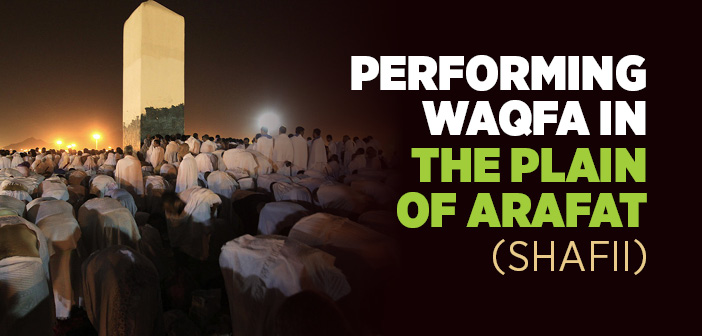What is the performing waqfa in the plain of arafat? What happens at the plain of arafat?
The most important essential act of hajj is waqfa (ritual standing) in the Plain of Arafat. Waqfa means to be in the Plain of Arafat on the 9th of Dhu al-Hijjah (the day before festival) between Noon and sunset. It is possible to perform waqfa in all states and forms being awake, sleeping, sitting, standing, or walking.
One who stays for a while on the 9th of Dhu al-Hijjah (the day before festival) between noon and dawn on the Day of Sacrifice [10 Dhu al-Hijjah] fulfills the requirement of waqfa in the Plain of Arafat. One who does not stay in the Plain of Arafat even for a short period of time misses the hajj. This person needs to re-perform hajj later.
Waqfa in the Plain of Arafat is the most important rite of hajj. In fact, this is stated in a hadith as follows, “The Hajj is Arafah. Whoever came to Jam’ during the night, before the time of Fajr, then he has attended the Hajj.” [2]
The Conditions of Waqfa
- Waqfa must be done during the time specified for it on the 9th of Dhu al-Hijjah.
- That the pilgrim be qualified to engage in acts of worship by not being insane or so inebriated that he has lost the proper use of his mental faculties. The waqfa performed by an insane, inebriated, or intoxicated person will not fulfill the obligation in this regard. As for someone who is in a coma or a swoon, he is considered to be like someone who is insane.
Sunnah Acts of Waqfa
- That men stop in the place where the Prophet used to do so, namely, at the large boulders at the foot of Mt. Mercy (Jabal al-Rahmah) if this poses no difficulty; otherwise, they should stand as close to the site as possible. As for women, it is recommended that they sit along the outer edges of the site unless they have sedan chairs or something similar, in which case it is preferable for them to ride in these.
- That one engage in frequent supplication, remembrance of God, and utterance of the words la ilaha illa Allah. One should repeat each supplication three times, opening by praising and glorifying God and praying for blessings upon the Prophet, and closing in the same way with an utterance of, “Amin.” One should also weep profusely and keep reciting chapters of al-Hashr (59) and al-Ikhlas (112). One should be in the state of minor purity, turn to the qiblah, raise his hands up, and should not raise his voice too much when saying supplications.
- Before performing waqfa, one should purify his heart from worldly thoughts as much as possible. One should pay attention to eat only foods which are permitted under Islamic law, keep one’s intention pure, and cultivate an attitude of humble reverence and modesty.
- One should lift one’s hands, though not above one’s head, that one remain exposed to the sun unless one has a legitimate excuse to do otherwise, and should avoid stopping in the roads in order to not to become an obstacle for others.
- One should be free of major or minor ritual impurity and of impurities on one’s body and clothing, keep one’s private parts concealed, face the qiblah, ride [rather than walk] if possible.
- One should not turn away beggars or despise any human being, and refrain from arguing, cursing and name-calling.
- One should stop in the Plain of Arafat until sundown in order to be present there at the time when day and night converge. Meanwhile the person should listen to the sermons delivered by the imams. It is a Sunnah to deliver sermons on the 7th, 9th, 10th and 12th days of Dhu al-Hijjah.



